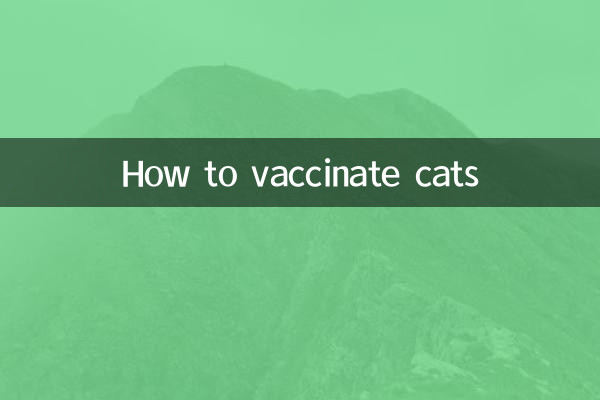Title: How to vaccinate cats
Recently, pet health has become one of the hot topics, especially discussions related to cat vaccination. This article will provide you with a detailed guide on vaccine types, vaccination procedures, precautions, etc.
1. Types and functions of cat vaccines

Cat vaccines are mainly divided into two categories: core vaccines and non-core vaccines. Core vaccines are required for all cats, while non-core vaccines are decided based on the cat’s living environment and health status.
| Vaccine type | prevent disease | Vaccination time |
|---|---|---|
| core vaccine | Feline distemper (FPV), Feline Herpes Virus (FHV-1), Feline Calicivirus (FCV) | First vaccination: 6-8 weeks of age, subsequent boosters every 3-4 weeks until 16 weeks of age |
| Non-core vaccines | Rabies, feline leukemia (FeLV), etc. | Usually given after 12 weeks of age based on veterinary recommendations |
2. Detailed process of vaccination
Vaccination needs to follow a scientific process to ensure the health and safety of cats. The following are the specific vaccination steps:
1.First physical examination: Before vaccination, the veterinarian will conduct a comprehensive health examination of the cat to ensure that there are no underlying diseases.
2.vaccination plan: Develop a personalized vaccination plan based on the cat’s age and health status.
3.vaccination process: Vaccines are usually given by subcutaneous injection, which is a quick and less painful process.
4.Observation period: After vaccination, you need to stay in the hospital for observation for 15-30 minutes to prevent allergic reactions.
3. Precautions for vaccination
Although vaccination is important, you also need to pay attention to the following points:
1.health status: Cats should not be vaccinated when they are sick or have low immunity.
2.allergic reaction: A small number of cats may be allergic to vaccine components and need to be closely observed after vaccination.
3.vaccination interval: A certain period of time is required between different vaccines to avoid overloading the immune system.
4.Reinforce regularly: Some vaccines require regular booster vaccinations to maintain immunity.
4. Recent hot topics: the safety of cat vaccines
Recently, discussions about the safety of cat vaccines have been hot on social media. Some pet owners worry about the side effects of vaccines, but scientific research shows that the benefits of vaccines far outweigh the risks. Here are answers to some frequently asked questions:
| question | Answer |
|---|---|
| Can vaccines make cats sick? | Vaccines are inactivated or attenuated viruses that will not cause illness in healthy cats. |
| What should I do if I feel unwell after vaccination? | Mild discomfort (such as drowsiness, loss of appetite) usually disappears within 1-2 days. If symptoms persist, seek medical attention. |
5. Summary
Vaccinating cats is an important measure to ensure their health. Through scientific vaccination plans and precautions, many infectious diseases can be effectively prevented. If you have any questions about vaccination, it is recommended to consult a professional veterinarian.
I hope this article can help you better understand the relevant knowledge of cat vaccination and provide comprehensive health protection for your pet.

check the details

check the details